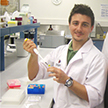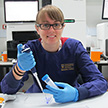Related Questions
- Is it possible to control your own body temperature?
- How does cardiovascular and cardiorespiritory diseases affect humans?
- I don't know who to ask but why are some people's hand cold while others are warm?
- Where are our pressure points and why do they immobilize and hurt us more than other parts of our body?
- What are the highest and lowest known pulses (heart rate) recorded?









The nervous system is broken into two components. the somatic and autonimic nervous systems. There are three parts to the autonomic nervous system, (happens automatically without thinking) the sympathetic, enteric and parasympathetic nervous systems which make up the autonimic nervous system. The sympathetic nervous system controls our flight of fight reponse to stress, the enteric nervous system controls our gut and the parasympathetic nervous system takes care of making sure all the bits in our body get oxygen and nutirents.
The somatic nervous system controls muscles and this is the system that allow voluntary movement.
Now breathing you would think is an essential part to the bodies survival right? so it should be automatic and thus controlled by the autonomic system yeah? well it does, but it also uses the somatic nervous system too. but why allow the somatic nervous system to override the autonimc system so you can hold your breath? now I don’t know why our bodies are set up to use both for breathing,, but i do know that you can’t hold your breath until you die. As you hold your breath for a long time, your body becomes starved of oxygen, and your autonomic system takes control and you feel the need to start breathing again. If you do manage to hold your breath until you pass out, you automatically start breathing again.
I guess the body cant take any risks with the heart, so it is only controlled by the autonomic nerouvs system and can’t be controlled to the point of stopping. but if you sit really still and take long slow steady breaths you will be able to make it beat much slower as you use less oxygen and it doesnt need to beat so fast.
3
Very good question ally11. You know what, we still ask a similar question today in science and we don’t know the exact answer. We don’t know why we breathe. One can immediately say because our cells need oxygen to function and release carbon dioxide as waste blah blah blah… This is the result of breathing but we don’t the underlying mechanism of breathing, what is the driving force of breathing? The gold standard of respiratory theory is known as hypoxic drive theory which suggests we breathe as a result of increased amounts of CO2 which is perceived by baroreceptors but recent evidence indicated that this theory can only be partially correct.
Coming back to your question “how come we can’t make our heart stop beating”. Well our heart needs to pump fresh blood which is rich in oxygen and nutrients to our body so that we can live. That’s the main function of our heart. I think it is obvious how crucial the role of our heart is for our survival. Now here comes the answer. Our nervous system evolved to develop a special system known as autonomic nervous system to make sure whether we are conscious or not, the most vital organs or systems in our body keeps working. Imagine if you had a full control of your heart, you can start or stop it on demand. What would happen when you go to sleep or if you fell unconscious after an accident, you would immediately die as you wouldn’t be in a position to deliberately controlling your heart.
Having said that as you can partially control your breathing you can partially control your heart beating. Some people are very good at slowing their heart rates as low as 10beats per minute. But you can’t stop it as you can’t stop breathing (you can hold your breath but can’t stop yourself from breathing eventually).
3